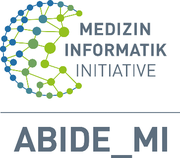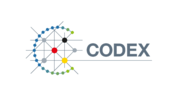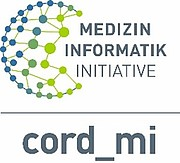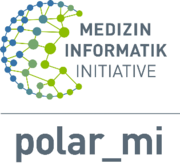You are here
Content

Application Center for Intelligent Machines in Medical Technology (ANIMMED)
The ANIMMED project supports small and medium-sized medical technology companies in Baden-Württemberg. The aim is to use artificial intelligence (AI) for the further development or new development of products. The center offers consulting, training, feasibility studies, access to training data, and help with regulations. Three demonstrators for medical technology AI systems serve as evaluation methods and reference projects.
Further information:
- www.forum-gesundheitsstandort-bw.de/projekte/wirtschaftsministerium/anwendungszentrum-fur-intelligente-maschinen-der-medizintechnik-animmed
- animmed.de

ABIDE_MI
The ABIDE_MI use case was a collaborative project involving a large number of German university hospitals from the four consortia of the Medical Informatics Initiative (MII). The project, which was launched in May 2021, aimed to enable the data integration centers (DIZ) of the MII to link patient data from routine care with information on biospecimens and make it usable for research purposes. In particular, researchers will be able to submit feasibility queries via the MII's German Research Data Portal for Health (FDPG).
Further information:

Baden-Württemberg Center for Digital Early Detection and Prevention of Vascular and Metabolic Diseases (BW-ZDFP)
The project focused on common diseases with high prevalence, morbidity, and mortality such as stroke, dementia, coronary heart disease, and metabolic disorders. BW-ZDFP used different patient groups with these diseases to validate molecular mechanisms and biomarkers. A hierarchical stepwise model was evaluated and biomarkers for early detection and prevention were validated in five consecutive steps. This included traditional molecular biomarker analysis, high-throughput molecular analysis, and big data evaluation of large at-risk and patient populations.
Further information:

CODEX
With the help of the CODEX research data platform, a secure, scalable, and interoperable infrastructure was created to provide research data on Covid-19 and network it between university hospitals nationwide. The aim was to provide the scientific community with structured, high-quality data and create the opportunity for innovative analyses.
Further information:

CORD-MI
The CORD-MI use case was a joint project involving all four consortia of the Medical Informatics Initiative and numerous German university hospitals and partner institutions. The main objective was to improve care and research in the field of rare diseases. The project built on the preliminary work of the Innovation Fund projects TRANSLATE-NAMSE and ZSEDUO as well as the national DIMDI project "Coding of Rare Diseases" and utilized the state of development of the Medical Informatics Initiative across the various consortia.
Further information:

Cooperation Network of University Medicine Baden-Württemberg
The Cooperation Network of University Medicine Baden-Württemberg brings together the four medical faculties and university hospitals in Freiburg, Heidelberg, Tübingen, and Ulm within a unified statewide structure. Its aim is to strengthen research, teaching, and clinical care across institutions - with a particular focus on digitalization, artificial intelligence, systems medicine, and the use of large interoperable data resources. By fostering close collaboration and pooling expertise, the network establishes a foundation for a high-performing and future-oriented academic medical landscape in the region.
Further information:

Medical Informatics in Research and Care in University Medicine (MIRACUM)
MIRACUM is one of four consortia supported by the Federal Ministry of Education and Research as part of the Medical Informatics Initiative (MII). In the phase from 2018 to 2022, the focus was on setting up data integration centers at German university hospitals. From 2023, this network of data integration centers will be expanded beyond the boundaries of university hospitals to include regional hospitals and other medical institutions (NUM-DIZ-Projekt).
Further information:

Nationales Pandemie Kohorten Netz (NAPKON)
The NAPKON project previously combined separate national research activities in a joint framework of cohorts and infrastructures. For the first time in Germany, NAPKON enabled close cooperation between all German university hospitals, non-university hospitals, and general practitioners. This was based on a common data protection concept and governance, standardized study protocols, and uniform work instructions for data collection and biosamples.
Further information:

NUM Routine Data Platform (NUM-RDP)
The NUM-RDP project aims to provide a generic routine data platform that includes routine clinical data from patient care. In the first funding period, the existing options for federated data storage and analysis from the Medical Informatics Initiative (MII) were expanded. This includes centralized data consolidation, storage, and output via MII partners and the introduction of a data management office. This extension enables future collaborative research projects by allowing data from NUM-RDP and MII to be used for research projects. In addition, the NUM Dashboard supports pandemic management through real-time tracking of care expenditures and patient characteristics.
Further information

POLAR_MI
POLAR_MI was a comprehensive use case involving all four consortia of the Medical Informatics Initiative (MII). Its main objective was to use MII methods and processes to help identify health risks in patients taking multiple medications.
Further information:

Development of an automated digital registry for patients with recurrent upper urinary tract stones (RECUR)
The digital, nationwide study registry for recurrent urolithiasis in the upper urinary tract was developed under the auspices of the German Society of Urology (DGU). It is supported by the DGU working groups Urological Research (AuF) and Urolithiasis (Urinary Stones Working Group). The registry uses the digital infrastructure of the BMFTR's Medical Informatics Initiative (MII). It supplements existing data from the hospital information systems together with patient-related data provided via a new patient app. This project is being implemented as an additional use case for the MII consortium MIRACUM. Urologists and medical informatics specialists from the MIRACUM centers in Dresden, Erlangen, Frankfurt, Freiburg, Giessen, Greifswald, Magdeburg, Mainz, Mannheim, and Marburg have joined forces to improve the structural and procedural framework for patients with recurrent urolithiasis. This includes advanced diagnostic algorithms and treatment pathways.
Further information:

Artificial intelligence for detecting the resectability of prostate cancer (RESECT)
RESECT aims to develop a competitive software solution for optimized therapy selection and planning for prostate cancer. This is based on the international Radiomics platform and includes AI-supported medical diagnostic solutions. In this unique partnership, academic medical institutions, public-private collaborations, a national professional society, and established and new market players in the field of digital medical technology were closely interlinked. This alliance has sought to create an end-to-end value chain to promote start-ups, growth and expansion of small and medium-sized companies in the field of digital medicine, especially artificial intelligence.
Further information:

Test and Development Center for Digital Patient Admission Systems (TEDIAS)
The TEDIAS project automates clinical recording processes, reducing the workload on staff and at the same time generating high-quality data for treatment, follow-up, and research. Integrated sensors in a chair automatically record vital parameters: TEDIAS measures heart sounds, blood pressure, oxygen saturation, hand strength, and temperature during the waiting time. Virtual doctors can also record the patient's medical history and symptoms and provide information about treatments. This actively involves patients and relieves staff at the same time.
Further information:
